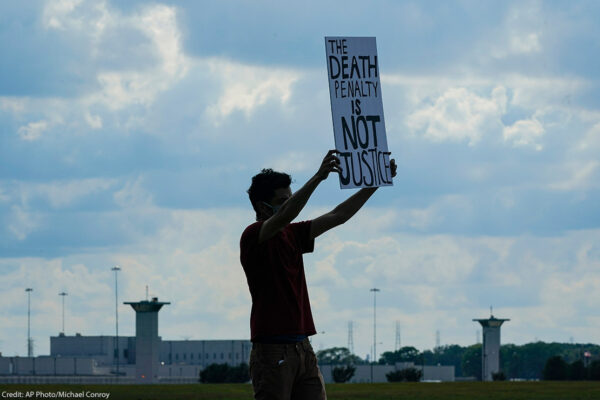Capital Punishment
All Cases
62 Capital Punishment Cases

U.S. Supreme Court
Jul 2025
Capital Punishment
Anthony Wainwright v. Governor of Florida et al.
Anthony Wainwright, who was facing imminent execution in Florida, attempted to file a petition in the Florida Supreme Court with the assistance of his pro bono counsel of choice. The court dismissed the petition only because his court-appointed refused to file it, despite the fact that Mr. Wainwright was entitled to do so under Florida law. He asked the United States Supreme Court to review his case to decide whether the Florida court’s action deprived him his constitutional right of access to the courts and his Sixth Amendment right to counsel. The United States Supreme Court refused to review the case, and the State of Florida executed him on June 10, 2025.
Explore case
U.S. Supreme Court
Jul 2025

Capital Punishment
Anthony Wainwright v. Governor of Florida et al.
Anthony Wainwright, who was facing imminent execution in Florida, attempted to file a petition in the Florida Supreme Court with the assistance of his pro bono counsel of choice. The court dismissed the petition only because his court-appointed refused to file it, despite the fact that Mr. Wainwright was entitled to do so under Florida law. He asked the United States Supreme Court to review his case to decide whether the Florida court’s action deprived him his constitutional right of access to the courts and his Sixth Amendment right to counsel. The United States Supreme Court refused to review the case, and the State of Florida executed him on June 10, 2025.

U.S. Supreme Court
Jul 2025
Capital Punishment
Glossip v. Oklahoma
This long-running Oklahoma death-penalty case raised two issues:
1) Would the State of Oklahoma be permitted to execute Glossip, despite overwhelming evidence that he is innocent, and despite a confession by the State’s Attorney General that the state obtained his conviction by hiding crucial evidence impeaching its star witness?; and
2) Would the Court reaffirm its longstanding commitment to Due-Process-Clause precedent requiring the government to disclose favorable evidence in its possession to the accused and to correct false testimony introduced against the accused?
Explore case
U.S. Supreme Court
Jul 2025

Capital Punishment
Glossip v. Oklahoma
This long-running Oklahoma death-penalty case raised two issues:
1) Would the State of Oklahoma be permitted to execute Glossip, despite overwhelming evidence that he is innocent, and despite a confession by the State’s Attorney General that the state obtained his conviction by hiding crucial evidence impeaching its star witness?; and
2) Would the Court reaffirm its longstanding commitment to Due-Process-Clause precedent requiring the government to disclose favorable evidence in its possession to the accused and to correct false testimony introduced against the accused?

U.S. Supreme Court
Jul 2025
Capital Punishment
Tabler v. Lumpkin
In Tabler v. Lumpkin, the ĚÇĐÄVlogrepresented a Texas death row prisoner whose lawyers refused to represent him at a hearing to determine his capacity to decide whether to give up his state post-conviction appeals, leaving him effectively unrepresented at that hearing. Our petition asked the Supreme Court to review Richard Tabler’s case and to hold that when a defendant’s lawyers abandon him, his waiver of further appeals should not bar his access to federal habeas corpus review of the constitutionality of his conviction.
Explore case
U.S. Supreme Court
Jul 2025

Capital Punishment
Tabler v. Lumpkin
In Tabler v. Lumpkin, the ĚÇĐÄVlogrepresented a Texas death row prisoner whose lawyers refused to represent him at a hearing to determine his capacity to decide whether to give up his state post-conviction appeals, leaving him effectively unrepresented at that hearing. Our petition asked the Supreme Court to review Richard Tabler’s case and to hold that when a defendant’s lawyers abandon him, his waiver of further appeals should not bar his access to federal habeas corpus review of the constitutionality of his conviction.

Kansas
Apr 2025
Capital Punishment
Challenging Death Qualification and the Death Penalty in Kansas
Every person accused of a crime is entitled to a jury of their peers that represents a fair cross section of their community. But that is never the reality for Black and brown people facing the death penalty. A process called death qualification excludes people from capital juries if they do not believe in the death penalty. Death qualification rigs juries to be whiter and more likely to convict. It discriminates against Black prospective jurors, women, and people of individual faiths that oppose capital punishment.
Our fight against death qualification is just one piece of our ongoing challenge to Kansas’ use of the death penalty. The ACLU, together with the law firms Hogan Lovells and Ali & Lockwood, Democracy Forward, and the Kansas State Board of Indigents’ Defense Services’ Death Penalty Defense Unit has brought constitutional challenges on behalf of four people charged in separate cases with capital murder. In each case, the case has resolved without a death sentence. In Wyandotte County, the judge issued an order finding extensive and irredeemable defects in the application of the death penalty.
Explore case
Kansas
Apr 2025

Capital Punishment
Challenging Death Qualification and the Death Penalty in Kansas
Every person accused of a crime is entitled to a jury of their peers that represents a fair cross section of their community. But that is never the reality for Black and brown people facing the death penalty. A process called death qualification excludes people from capital juries if they do not believe in the death penalty. Death qualification rigs juries to be whiter and more likely to convict. It discriminates against Black prospective jurors, women, and people of individual faiths that oppose capital punishment.
Our fight against death qualification is just one piece of our ongoing challenge to Kansas’ use of the death penalty. The ACLU, together with the law firms Hogan Lovells and Ali & Lockwood, Democracy Forward, and the Kansas State Board of Indigents’ Defense Services’ Death Penalty Defense Unit has brought constitutional challenges on behalf of four people charged in separate cases with capital murder. In each case, the case has resolved without a death sentence. In Wyandotte County, the judge issued an order finding extensive and irredeemable defects in the application of the death penalty.